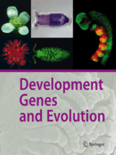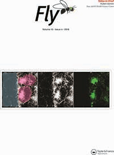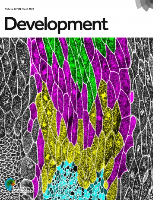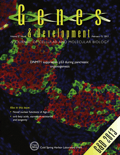
DEVELOPMENT GENES AND EVOLUTION
Scope & Guideline
Pioneering Research at the Intersection of Genes and Development.
Introduction
Aims and Scopes
- Developmental Genetics:
The journal emphasizes the genetic basis of development, exploring how genes regulate embryonic development and differentiation across various organisms. - Evolutionary Developmental Biology (Evo-Devo):
A core focus lies in understanding how evolutionary processes shape developmental pathways and morphological diversity, particularly through comparative studies across species. - Functional Genomics:
Research on the functional roles of genes, including studies on gene knockouts, overexpression, and the evolutionary implications of gene duplication and loss, is prevalent. - Model Organisms:
Utilization of model organisms such as zebrafish, Drosophila, and others to investigate developmental processes and their evolutionary context is a significant aspect of the journal's scope. - Morphological and Physiological Studies:
The journal includes studies that analyze the morphological and physiological aspects of development, providing insights into how these traits evolve. - Molecular Evolution:
Research examining the molecular evolution of genes and regulatory networks, including transcription factors and signaling pathways, is an essential part of the journal's contributions.
Trending and Emerging
- CRISPR and Genetic Manipulation Techniques:
Recent papers increasingly utilize CRISPR/Cas9 and other advanced genetic manipulation techniques to dissect gene functions and their evolutionary implications, showcasing a trend towards more precise experimental approaches. - Interactions Between Development and Environment:
There is a growing focus on how environmental factors influence developmental processes, such as thermal plasticity and stress responses, reflecting an emerging interest in eco-evolutionary dynamics. - Integrative Evo-Devo Approaches:
Research combining genetic, morphological, and ecological data to understand the evolution of development is on the rise, indicating a trend towards interdisciplinary studies that bridge various biological fields. - Role of Transcription Factors in Development:
An increasing number of studies are exploring the roles of transcription factors in developmental processes, particularly in the context of evolution, highlighting their importance in both fields. - Comparative Genomics:
The journal has seen a surge in comparative genomic studies that analyze gene content and expression across different species, providing insights into evolutionary relationships and developmental innovations.
Declining or Waning
- Traditional Morphology Studies:
There has been a noticeable decrease in studies focusing solely on traditional morphological descriptions without molecular or genetic context, indicating a shift towards more integrative approaches. - Simplistic Evolutionary Models:
Research employing overly simplistic evolutionary models that do not account for complexity in developmental processes has become less common, as the field moves towards more nuanced understandings. - Studies on Non-Model Organisms:
While still present, there is a decline in the number of publications centered on non-model organisms, possibly due to the challenges in obtaining genetic and developmental data compared to well-characterized models.
Similar Journals

Journal of Developmental Biology
Fostering Innovation in Biological DevelopmentJournal of Developmental Biology, published by MDPI, is an esteemed open access journal that has been contributing to the field since its inception in 2013. With a focus on developmental processes across various biological systems, this journal serves as a vital platform for disseminating cutting-edge research and fostering dialogue among experts in the fields of Cell Biology, Developmental Biology, and Molecular Biology. The journal currently holds a commendable Q2 ranking in both Developmental Biology and Molecular Biology, underscoring its significance in advancing knowledge within these domains. Operating out of Switzerland, and featuring an engaging array of articles, the journal prioritizes accessibility through its Open Access model, further expanding the reach of vital research findings. Whether you are a seasoned researcher or an enthusiastic student, the Journal of Developmental Biology provides an essential resource for the latest insights and developments in this rapidly evolving field.

EvoDevo, published by BMC, is a premier open-access journal dedicated to the fields of Developmental Biology, Ecology, Evolution, Behavior and Systematics, and Genetics. With an impressive Q1 ranking in its category for 2023, EvoDevo stands out as a significant resource for researchers, professionals, and students seeking to explore the intricate relationships between evolutionary processes and developmental mechanisms. Since its inception in 2010, this UK-based journal has provided a platform for innovative research and insights, boasting rigorous peer-review standards that ensure high-quality publications. With the E-ISSN of 2041-9139 and a commitment to freely accessible research, EvoDevo is positioned at the forefront of scientific discourse, making vital contributions to our understanding of biological complexities. As the journal converges years from 2010 to 2024, it serves as a cornerstone for knowledge dissemination, inspiring future research trajectories in evolutionary developmental biology.

CURRENT OPINION IN GENETICS & DEVELOPMENT
Advancing insights in genetics and development.CURRENT OPINION IN GENETICS & DEVELOPMENT is a prestigious journal published by CURRENT BIOLOGY LTD that offers an insightful platform for the latest developments and emerging trends in the fields of genetics and developmental biology. Established in 1991 and set to continue until at least 2024, this journal achieves notable recognition in the academic community with a Q1 classification in both its major categories as of 2023. With a Scopus rank placing it within the top quartile for both genetics and developmental biology, it serves as an essential resource for researchers, professionals, and students seeking to enhance their understanding of genetic mechanisms and developmental processes. While currently not an open-access journal, readers can explore the collection of high-quality articles that contribute to shaping contemporary scientific discourse and fostering innovation within these dynamic fields. For those dedicated to advancing their research and knowledge, CURRENT OPINION IN GENETICS & DEVELOPMENT stands as a vital and influential academic publication.

FLY
Uncovering the Secrets of the Insect WorldFLY, an esteemed journal published by Taylor & Francis Inc, is a leading resource in the field of Insect Science, offering cutting-edge research and insights into the biology, ecology, and management of flies and related insect species. With an impressive Impact Factor reflecting its high citation and publication standards, FLY serves as a vital platform for researchers and practitioners aiming to advance their understanding of this diverse and crucial group of organisms. The journal, which has been publishing since 2007 and is set to continue until 2024, is recognized as a Q1 category journal in its discipline, ranked 58 out of 181 in Agricultural and Biological Sciences, placing it in the 68th percentile of the field. Although currently non-open access, the journal is committed to disseminating valuable knowledge and fostering collaboration among scientists, offering unparalleled opportunities for professionals, researchers, and students to engage with transformative science in the insect realm.

Open Biology
Advancing the frontiers of life sciences.Open Biology is a prestigious, interdisciplinary journal published by the Royal Society that has been paving the way in the fields of Biochemistry, Genetics and Molecular Biology, Immunology, and Neuroscience since its inception in 2011. Catering to a global audience of researchers, professionals, and students, Open Biology operates under an open access model, facilitating the unrestricted dissemination of high-quality research findings. With a current impact factor that positions its categories in the top quartile (Q1) and impressive Scopus rankings—evidencing its influence and reach—this journal serves as a vital platform for innovators and scientific inquiries aimed at advancing our understanding of life sciences. The journal's commitment to publishing cutting-edge research makes it an essential resource for those at the forefront of scientific exploration.

Annual Review of Genetics
Synthesizing Knowledge to Propel Genetic Research Forward.The Annual Review of Genetics is a premier academic journal dedicated to advancing the field of genetics through critical, comprehensive reviews that synthesize current research and highlight future directions. Published by Annual Reviews, this esteemed journal boasts an impressive impact factor, ranking in the Q1 category for Genetics, and holds a distinguished position as 14th out of 347 journals in the Scopus ranking for Genetics, placing it in the 96th percentile among its peers. With its convergence of knowledge from 1970 to 2023, the journal serves as an essential resource for researchers, professionals, and students alike, facilitating a deeper understanding of genetic principles and their applications. Although the journal is not open access, it remains a vital platform for disseminating high-quality, peer-reviewed content that shapes the conversation in genetics, making it a must-read for those seeking to stay at the forefront of this dynamic field.

DEVELOPMENT
Pioneering insights into developmental processes and health.DEVELOPMENT is a preeminent journal published by COMPANY BIOLOGISTS LTD, headquartered in the United Kingdom. With an ISSN of 0950-1991 and an E-ISSN of 1477-9129, this esteemed journal has been at the forefront of the fields of Developmental Biology and Molecular Biology since its inception in 1987. Recognized for its rigorous peer review process and high-caliber research, DEVELOPMENT holds an impressive Q1 ranking in both disciplines as of 2023, underscoring its pivotal role in advancing scientific understanding. The journal is particularly noted for its contributions to the understanding of developmental processes, their molecular underpinnings, and their implications in health and disease. With a significant impact factor, DEVELOPMENT aims to disseminate groundbreaking research that inspires novel insights and future explorations within the biological sciences, making it an essential resource for researchers, professionals, and students alike. The journal also maintains accessibility for its readership, ensuring that significant research findings reach those who can apply and build upon them.

GENES & DEVELOPMENT
Innovating Research at the Intersection of Genes and DevelopmentGENES & DEVELOPMENT, published by COLD SPRING HARBOR LAB PRESS, stands as a premier journal in the fields of Developmental Biology and Genetics, boasting a remarkable impact factor that reflects its prestigious position in the academic community—ranking Q1 in both disciplines as of 2023. Since its inception in 1987, this journal has been at the forefront of disseminating cutting-edge research, effectively bridging the gap between laboratory breakthroughs and their applications in health and disease. Researchers and professionals rely on GENES & DEVELOPMENT for its rigorous peer-review process and its commitment to promoting innovative studies that unravel the complexities of gene functions and developmental processes. With Scopus rankings placing it in the top percentile among its peers, this journal serves as a vital resource for students and established scientists alike, aspiring to expand their knowledge and contribute to the ever-evolving landscape of genetic and developmental research.

GENETICS AND MOLECULAR BIOLOGY
Empowering researchers to shape the future of biology.GENETICS AND MOLECULAR BIOLOGY, published by the SOC BRASIL GENETICA, is a prominent journal dedicated to the advancement of knowledge in the fields of genetics and molecular biology. Since its inception in 1998, this Open Access journal has served as a vital platform for researchers, professionals, and students to disseminate their findings and engage with the latest innovations and discoveries. With an impact factor that reflects its growing influence, GENETICS AND MOLECULAR BIOLOGY ranks in the Q3 category for both genetics and molecular biology as of 2023, indicating its position within the academic community. The journal is indexed in Scopus, highlighting its commitment to maintaining rigorous peer-review standards while providing wide-reaching access to quality research. Operating out of Ribeirão Preto, Brazil, it fosters a collaborative environment for academic discourse and research development not only in Brazil but also globally. The journal encourages submissions that explore a wide range of topics in genetics and molecular biology, making it an essential resource for anyone involved in these dynamic fields.

Russian Journal of Developmental Biology
Unraveling the mysteries of developmental biology.The Russian Journal of Developmental Biology, published by PLEIADES PUBLISHING INC, serves as a significant platform for researchers and professionals engaged in the field of developmental biology. With the ISSN 1062-3604 and E-ISSN 1608-3326, this journal focused on intricate biological processes and dynamic developmental mechanisms from 2005 until 2017. Although its coverage is currently discontinued in Scopus, it remains notable for its contribution to understanding the pivotal roles of biochemistry and molecular genetics within the context of development. As a publication situated in the competitive quartiles of the field and boasting an influential Scopus rank of #77 out of #78, it has made a unique mark in developmental studies. Researchers and academics seeking to enhance their knowledge of historical advancements in the discipline will find the journal a valuable resource, even as it navigates the transition away from active publication.